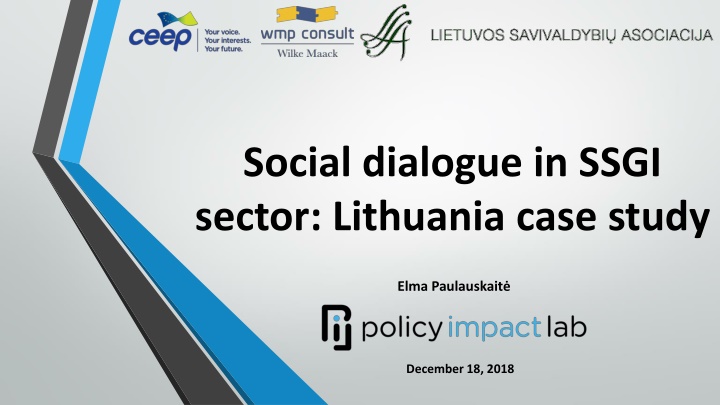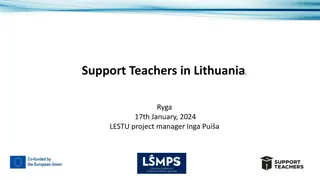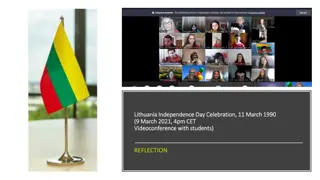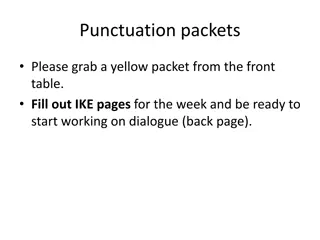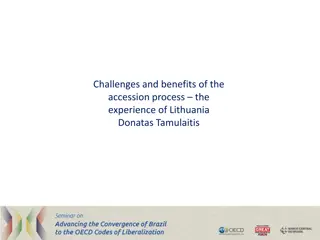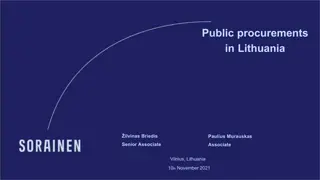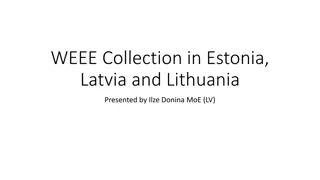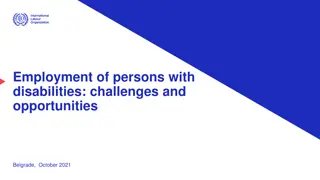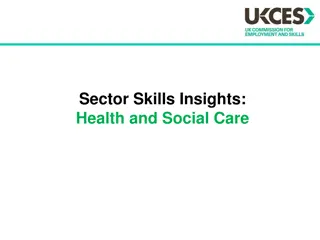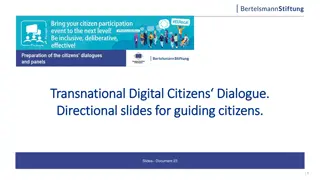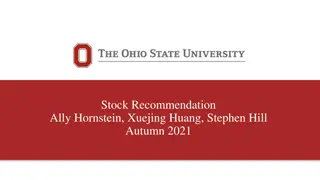Social Dialogue in SSGI Sector: Lithuania Case Study Analysis
This case study delves into the landscape of Social Services of General Interest (SSGI) in Lithuania, focusing on service provision, employer organizations, challenges, and trends. It explores the roles of public and private entities, the financing mechanisms, and the delivery models in the SSGI sector. Various associations and umbrella organizations representing SSGI employers are identified, shedding light on the diversity and complexity of the sector's organizational structure.
Download Presentation

Please find below an Image/Link to download the presentation.
The content on the website is provided AS IS for your information and personal use only. It may not be sold, licensed, or shared on other websites without obtaining consent from the author.If you encounter any issues during the download, it is possible that the publisher has removed the file from their server.
You are allowed to download the files provided on this website for personal or commercial use, subject to the condition that they are used lawfully. All files are the property of their respective owners.
The content on the website is provided AS IS for your information and personal use only. It may not be sold, licensed, or shared on other websites without obtaining consent from the author.
E N D
Presentation Transcript
Social dialogue in SSGI sector: Lithuania case study Elma Paulauskait December 18, 2018
Content About the case study (Very briefly) SSGI service provision in LT SSGI employers who is who, what is their role Survey: challenges & trends Points for further discussion
About the case study Objectives: Map how SSGIs are provided (public/private) Identify employers organisations Survey employers to identify challenges in relation to service provision
SSGI & other social service provision in LT Management: all state Financing: mostly state -through procurement (children s day care centres); payment for services rendered (healthcare, residential care); self-directed funding (ECEC) Delivery: Mostly public: tertiary healthcare, residential care; Mostly private (incl. third sector): children s day care centres; dental.
SSGI employer organisations (mostly private/non-profit) No single umbrella organization only employers organization strictly speaking joins some three associations related to social services. Proxies for employer organisations: Umbrellas of associations: Lithuania's Confederation of Employers / Lietuvos darbdavi konfederacija; National platform for non-governmental development cooperation organisations / Nacionalin nevyriausybini vystomojo bendradarbiavimo organizacij platforma; Lithuanian Association of Local Authorities / Lietuvos Savivaldybi Asociacija Associations of private/non-profit providers: Association of Lithuanian Private Health Care Organizations / Lietuvos priva i sveikatos prie i ros staig asociacija; National Association of Healthcare Organisations / Nacionalin Gydymo staig Asociacija;
SSGI employer organisations (public and mixed) Associations of public and mixed entities: Association of Lithuania's children's day centres / Lietuvos vaik dienos centr asociacija Association of Public Health Bureaus / Visuomen s sveikatos biur asociacija Association of Regional Hospitals / Lietuvos rajonini ligonini asociacija Lithuanian National Association of Healthcare Organisations / Nacionalin s Sveikatos Prie i ros staig Asociacija Associations of directors/executives of SSGI providers: Association of Directors of Municipal Social Care Institutions / Savivaldybi socialin s globos staig vadov asociacija(SIVA) Association of Directors of Lithuanian Long-term Care Institutions/ Lietuvos pagyvenusi irne gali moni globos staig ir vadovaujan i darbuotoj asociacijaR pestingaGloba Lithuanian Association of Physicians Executives / LietuvosGydytoj Vadov S junga
SSGIs - other associated structures Associations of employees of SSGI providers (not trade unions: Lithuanian Association of Social Workers / Lietuvos socialini darbuotoj asociacija Young Doctors' Association /Jaun j gydytoj asociacija Lithuanian Medical Staff Union / Lietuvos medik s j dis
EU/international cooperation Council of European Municipalities and Regions / Europos savivaldybi ir region taryba European Hospital and Healthcare Employers Association (HOSPEEM) Hospeem / Europos ligonini ir sveikatos prie i ros organizacij asociacija European Association of Craft, Small and Medium-Sized Enterprises (UEAPME) / Europos amat ,ma j ir vidutini moni asociacija Hanse-Parlement Network for SMEs / Hanza Parlamentas European Association for Directors and Providers of Long-term Care Services for the Elderly EDE / Europos globos staig vadov ir paslaug teik j asociacija International Federation of Social Workers (Europe) / Tarptautin socialini darbuotoj federacija European Network for Development Cooperation CONCORD / Europos vystomojo bendradarbiavimoorganizacij tinklas Global Education network GLEN / Europos globaliojo vietimotinklas Global Network of NGO Platforms FORUS / NVO platform tinklas
What is their role? Unite considerable share of providers/professionals from specific sub- sectors. Lobbying/advocacy on behalf of specific sub-sector as a whole. Contribute to/inform/provide evidence for policy. Knowledge sharing/competence building. Awareness raising/education of the public on specific sub-sector. Networking, facilitation of partnerships on all levels. Intermediary between providers/employees and local/national government or EU. Social dialogue?
Challenges related to employees & service provision Related to employees of providers of SSGIs: Shortage of qualified staff/ wages too low / skills & competence among staff insufficient Unsustainable workload for employees/providers in SSGI sector. Unsafe work environments when working e.g. with social risk families. Room for improvement of professional image of workers in SSGIs in media/public opinion. Related to financing/provision of services: Govt sets low prices for social services (e.g. in case of procurement fixed price / unit) --e.g. financing of services insufficient. Limited access to social care services for end users / Range of existing services (e.g. extension of services to recreational activities in day care, long-term care) is limited due to lack of funding.
Aspirations: social dialogue for addressing challenges 1. Legal tool: Legally binding [collective] agreements as effective avenue to real change to working conditions of SSGI providers and staff; possibility to inform/change policies. 2. Informational/transparency facilitating tool: Feedback loop from providers/workers to public authorities including on the utility of services for the end users; 3. Conflict resolution/problem solving tool: Enables agreement between all parties; facilitates solution of local issues through better understanding of positions of all actors involved 4. Tool for bridging the gap (EU level) could contribute to convergence between Member States, not least through mutual exchange/learning (EU/EU- 13 or other)
Trends: social dialogue in SSGIs Representativeness:Trade Unions -% of workers represented ~5%; Employers represent ~ 25%. Checks and balances -government not used to systematically consulting social partners e.g. in labour exchange reform, education reform, etc. How to get involved? All organisations consulted regularly by government on their specific sub-sector, but only ALAL and Employers Confederation included in social dialogue (Tripartite Council) sectoral agreements in Social Care, Health Care and Education include only government and trade unions. Sectoral social dialogue marked as important by all respondents. Cross-sectoral social dialogue marked as important by few respondents. EU level social dialogue seen as useful only for the exchange of good practice; but requires resources most provider organisations can t afford.
Points for further discussion How can entities with a stake in SSGI provision have their voice heard in social dialogue if they re not party to national level agreements? How can government meaningfully engage social partners in addressing some of the issues above? Is existing regulation, including the new Labour Code sufficient to address challenges or should social dialogue be further regulated to help it function? Can higher level issues (competence, mutual learning, EU level cooperation) be meaningfully addressed while there are pending issues like earning a living wage for employees in SSGI sector?
Thank you for listening! Elma@policyimpactlab.com
